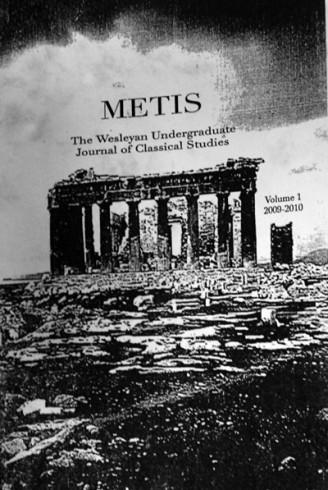Metis Showcases Classical Studies Writing

The Greek Titan Metis was considered the goddess of wisdom and deep thought. Her name in Greek also means “wisdom combined with cunning,” a highly desirable personality trait to the ancient Athenians.
This year, a group of Wesleyan students with a knowledge and interest in Classical studies, released their own collection of “cunning wisdom” in a publication titled Wesleyan Metis. The Metis editorial board draws on the abilities and creativity of Wesleyan students to showcase their best examples of undergraduate Classics writing.
“Classical studies go far beyond ancient languages and, as evidenced by the essays in the journal, include studies of archaeology and drama or even ancient medicine, sociology, mythology, poetry and more,” says Metis creator Christi Richardson ’10. “There are so many fields of interest in the classics that Metis can illuminate for Wesleyan students. We hope that Metis can get the word out to the Wesleyan community and showcase the wide range of areas of study available to students.”
The editors received 16 submissions for the first issue and selected six pieces to include.
The first issue of Wesleyan Metis features five articles and one photography section, including a short fictional story about the Athenian plague, an essay related to how ancients perceived statues of nude women that were modeled after Aphrodite statues, a look at Sir Arthur Evan’s Interpretation of the Palace of Knossos, and images of Pompeii and Rome.
In “The Plague,” author Kaitlin DeWilde ’13 writes about a young woman named Ariadne who played the nascent role of a doctor during the Athenian plague in 430-429: “As soon as I saw my sister, I knew there was nothing I could do. The worst red boils I had ever seen covered her skin; she thrashed around the bed in the throes of madness, indicative of close proximity to death.”
In “Balnea Mixta et Separata,” author Susie Howe ’11 describes how men and women used community baths as gathering places and centers of social activity. The oldest baths in Pompeii occupied a full city block and included many amenities like a swimming pool, courtyard exercise space, dry hot room and dressing room. “The baths have a separate entrance for men and women, labeled as such and leading to the separate non-communicable bathing suites.”
Richardson and her peers started Metis last fall, basing the publication on the Psychology Department’s journal, Mind Matters. The spring 2010 editors of Metis include Richardson, Howe, Ellie Damaskos ’12, Nathaniel Durant ‘12, Susan Howe ’11, Chris Kaltsas ‘11 Adam Peck ‘12. Dylan Griffin ’12 assisted with layout and printing of the 56-page journal.
Wesleyan’s Department of Classical Studies funds publication costs.
“In a discipline like Classics, as in almost any of the Humanities, collaborative work is much rarer than it is in science. This project made it possible for our students to work together. They had full responsibility for every aspect of the publication, most importantly for editorial choices, and they took that responsibility seriously,” says Andrew Szegedy-Maszak, professor of classical studies and the Jane A. Seney Professor of Greek.
The Classical Studies Department distributed copies to alumni during Reunion & Commencement Weekend. Other copies are available in Downey House.
“The response from our alumni was uniform enthusiasm, tinged with a trace of wry envy. ‘Wow – why didn’t we do something like this?’ It’s another way of keeping our grads in touch with us and with each other,” Szegedy-Maszak says. “I’m really proud of Metis, as are my colleagues, and we look forward to Volume 2.”

